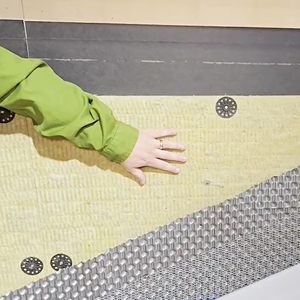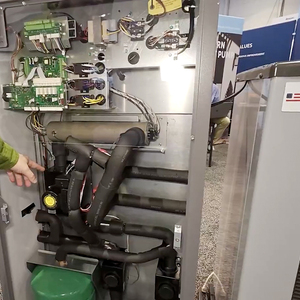*
Is there a type of central A/C that uses an “air intake” Several news stories about some CO deaths in NY a few months ago have mentioned this: for example, this snippet from the Baltimore Sun:
QUOTE
Dr. Andrei Kranz disconnected the carbon monoxide
detector in his Long Island, N.Y., home last summer because the
device kept going off for no apparent reason and waking the family.
In May, Kranz came home to find his parents, his 3-year-old
daughter, the nanny and two houseguests dead in their beds, all
victims of carbon monoxide poisoning.
Police investigators found that someone had turned on the air
conditioner without shutting off the furnace. The air conditioner’s
intake filter was clogged with leaves, so the cooling system
drew in furnace fumes instead.
END QUOTE
I’ve been puzzling over this for awhile; never seen such a beast.
Bob



















Replies
*
In some cases where the furnace or other gas appliance are located in a small room, where gas fired appliances per 1000 bus of input do not have 50 q. in. of area in the room,there must be combustion air from outside brought in. Still this may not solve the problem. Return air must be sealed to prevent a room from going negative. There are fresh air devices that connect to the return air with a barometric damper in them to control air flow. Then cut a supply register in the plenum to positively pressurize the room. This so be done by a qualified a/I etch, but there are so few.
*Lorne,That part I'm familiar with, but its the "air intake for the A/C" which has me puzzled.Do you suppose they meant that the central air _return_ was blocked, so the A/C air handler started pulling through leaks in the return in the utility room?"This so be done by a qualified a/I etch, but thereare so few."Yesterday I inspected a house that had major flue gas spillage from the water heater bonnet. Probably because there was a 90 degree elbow on the bonnet, about a 10' - 12' horizontal (slightly inclined) run to the chimney. The owners told me that they had had the gas co out a year before because of a gas leak and were told that the "systems were fine" and had had a chimney sweep check the flues and fire places out. They didn't mention any HVAC technicians, but, come on now.Bob
*With all due respect to the Doctor's dead family, and with little respect to the Doctor...I just hate reading about these "accidents".Here's an apparently well-educated man who cares enough for his family to install, or at least upkeep, a monitor that is designed to detect a lethal gas that is colorless, odorless, tasteless, etc.The monitor continually goes off...yet it must be a false alarm, since he doesn't see, smell, or taste anything abnormal in the air.Thus, since the alarm designed to detect the lethal, colorless, odorless, and tasteless gas is contantly sounding and he doesn't see, smell, or taste anything, then the alarm must be bad.I sure hope he's a PhD and not an MD. Yeah, yeah, he's grieving...I would be to if played a role in my family's death.Frustratedy, and with nothing constructive to add to this thread, Mongo
*There has been some question raised as to whether he had disabled the detector; the first reports said he did, the second round of reports mentioned that he disputed statements attributed to him, without specifying exactly what he was disputing.He is a medical MD.There is a great deal of stupidity in the area of CO.The "Chicago" experience is a prime example. Awhile ago, Chicago passed an ordinance requiring CO detectors in homes (maybe just rentals?) The heating season came, and alarms started sounding (thousands.) As I heard it from Jim Davis, the leading expert on CO analysis, the gas and fire companies responded to the alarms, using (i) Monoxor (_Not_ Monoxor II) CO detectors - which have a minimum threshhold of 100ppm, and (ii) Tiff combustible gas detectors which can detect CO down to 2,000 ppm!They decided that the alarms were all (mostly?) false alarms and the city rescinded the ordinace (and gave CO detectors a black eye.)Then, at the urging of the gas industry, among others, UL revised the standards for CO alarms making them far less sensitive to low levels.Although everyone knows CO can kill at high concentrations, its not as widely known that it can cause some pretty serious, long lasting health effects at low levels with chronic exposure.Another example: my local fire dept responds to CO alarms, but has a CO problem in its own building, so it's instruments are completely undependable!Bob
*
Is there a type of central A/C that uses an "air intake" Several news stories about some CO deaths in NY a few months ago have mentioned this: for example, this snippet from the Baltimore Sun:
QUOTE
Dr. Andrei Kranz disconnected the carbon monoxide
detector in his Long Island, N.Y., home last summer because the
device kept going off for no apparent reason and waking the family.
In May, Kranz came home to find his parents, his 3-year-old
daughter, the nanny and two houseguests dead in their beds, all
victims of carbon monoxide poisoning.
Police investigators found that someone had turned on the air
conditioner without shutting off the furnace. The air conditioner's
intake filter was clogged with leaves, so the cooling system
drew in furnace fumes instead.
END QUOTE
I've been puzzling over this for awhile; never seen such a beast.
Bob